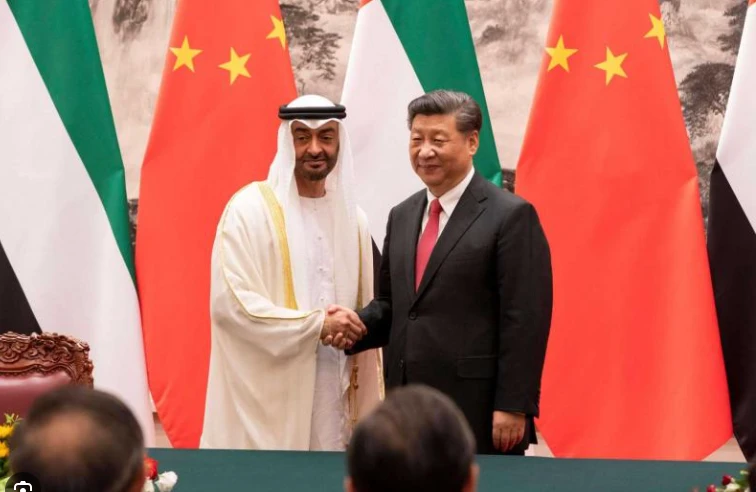China hosts Arab leaders at forum aimed at deepening ties

Stay tuned with 24 News HD Android App

China on Wednesday hosts a litany of Arab dignitaries and diplomats ahead of a forum Beijing hopes will deepen ties with the region and present a "common voice" on the conflict between Israel and Hamas.
Beijing has sought to build closer ties with Arab states in recent years, and last year brokered a detente between Tehran and its long-time foe Saudi Arabia.
It has also historically been sympathetic to the Palestinian cause and supportive of a two-state solution to the Israeli-Palestinian conflict.
And Beijing last month hosted rival Palestinian groups Hamas and Fatah for "in-depth and candid talks on promoting intra-Palestinian reconciliation".
Egypt's President Abdel Fattah al-Sisi and UAE President Sheikh Mohamed bin Zayed Al Nahyan, as well as a host of other regional leaders and diplomats, are among the delegates attending the forum.
President Xi Jinping is set to deliver a keynote speech at the opening ceremony on Thursday, Beijing has said, aimed at building "common consensus" between China and Arab states.
Top of the agenda will be the war between Israel and Hamas, which Xi has called for an "international peace conference" to resolve.
China sees a "strategic opportunity to boost its reputation and standing in the Arab world" by framing its efforts to end that conflict against US inaction, Ahmed Aboudouh, an associate fellow with the Chatham House Middle East and North Africa Programme, told AFP.
"This, in turn, serves Beijing's focus on undermining the US's credibility and influence in the region," he said.
"The longer the war, the easier for China to pursue this objective," he added.
On Tuesday, Foreign Minister Wang Yi met with counterparts from Yemen and Sudan in Beijing, saying he hoped to "strengthen solidarity and coordination" with the Arab world.
He also raised China's concerns over disruptive attacks on Red Sea shipping by Iran-backed Huthi forces acting in solidarity with Hamas with his Yemeni counterpart Shayea Mohsen al-Zindani.
"China calls for an end to the harassment of civilian vessels and to ensure the safety of waterways in the Red Sea," state news agency Xinhua quoted him as saying.
Xi meets Egyptian leader Sisi
President Xi Jinping welcomed Egyptian counterpart Abdel Fattah al-Sisi to Beijing on Wednesday, as the Chinese capital hosts a number of Arab dignitaries for a forum it hopes will deepen ties with the region.
Several Arab leaders are this week visiting Beijing, which is seeking to present a "common voice" on the conflict between Israel and Hamas and improve cooperation.
Xi met Sisi in a grand ceremony outside Beijing's Great Hall of People on Wednesday afternoon, state media footage showed, with the national anthems of both countries blaring out.
Cairo has said the two will discuss "regional and international issues of common interest".
"Discussions will tackle ways to forge closer bilateral relations and to unlock broader prospects for cooperation in an array of fields," the Egyptian presidency said.
Beijing has sought to build closer ties with Arab states in recent years, and last year brokered a detente between Tehran and its long-time foe Saudi Arabia.
It has also historically been sympathetic to the Palestinian cause and supportive of a two-state solution to the Israeli-Palestinian conflict.
And Beijing last month hosted rival Palestinian groups Hamas and Fatah for "in-depth and candid talks on promoting intra-Palestinian reconciliation".
United Arab Emirates President Sheikh Mohamed bin Zayed Al Nahyan, as well as a host of other regional leaders and diplomats, is also among the delegates attending the forum.
Xi is set to deliver a keynote speech at the opening ceremony on Thursday, Beijing has said, aimed at building "common consensus" between China and Arab states.
Top of the agenda will be the war between Israel and Hamas, which Xi has called for an "international peace conference" to resolve.
- 'Strategic opportunity' -
China sees a "strategic opportunity to boost its reputation and standing in the Arab world" by framing its efforts to end that conflict against US inaction, Ahmed Aboudouh, an associate fellow with the Chatham House Middle East and North Africa Programme, told AFP.
"This, in turn, serves Beijing's focus on undermining the US's credibility and influence in the region," he said.
"The longer the war, the easier for China to pursue this objective," he added.
On Tuesday, Foreign Minister Wang Yi met with counterparts from Yemen and Sudan in Beijing, saying he hoped to "strengthen solidarity and coordination" with the Arab world.
He also raised China's concerns over disruptive attacks on Red Sea shipping by Iran-backed Huthi forces acting in solidarity with Hamas with his Yemeni counterpart Shayea Mohsen al-Zindani.
"China calls for an end to the harassment of civilian vessels and to ensure the safety of waterways in the Red Sea," state news agency Xinhua quoted him as saying.
